Inside Beirut’s Digital District
Jon Hamm’s new movie, Beirut, opened last week–and residents of Lebanon’s capital are already shaking their heads.
Once again, Hollywood is portraying their city as a burning war zone where bullets fly and terrorists lurk. Locals, however, know that today’s Beirut is not like that. Luxury apartment buildings rise above the sparkling Mediterranean Sea. Hip cafés and trendy yoga studios compete for space with fancy patisseries and sleek skate shops. Burberry, Calvin Klein, and Abercrombie & Fitch have all taken up residence in the city’s swanky shopping districts. And nowhere is the spirit of modern-day Lebanon more on display than at the Beirut Digital District (BDD), the nexus of the country’s burgeoning startup scene.
BDD is a Google-like campus poetically situated on the Green Line that separated fighting factions during the country’s civil war (which, most Lebanese are quick to point out, ended nearly 30 years ago). BDD hosts 10 buildings and almost 100 tenants—startups, accelerators, and investors. Individual company offices flash the exuberant decor and open-plan aesthetic you’d find on any Silicon Valley campus. Sunny courtyards and playful common spaces provide places to hang out. Training and conference areas are available for larger gatherings. And BDD regularly organizes community events, like talks on fundraising, growth hacking, and finding one’s passion.
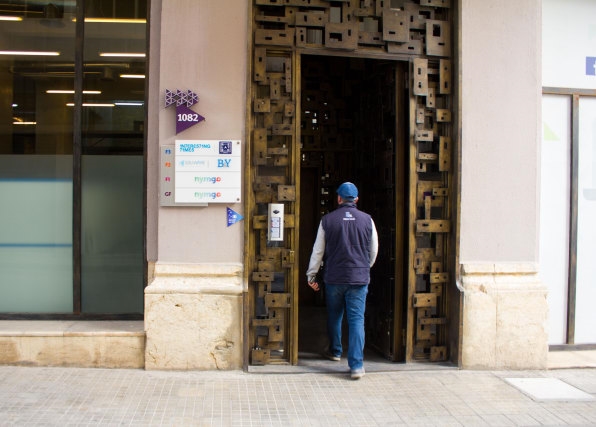
The country’s first incubator opened its doors about 15 years ago, but the ecosystem really mushroomed in 2013, after the Lebanese central bank took a radical step that opened the floodgates on funding. The economy needed a new leg, the bank’s governor decided. In a trend being witnessed across the Arab world, Lebanon is looking to tech and innovation to create the jobs badly needed in a country suffering from desperately high levels of unemployment. Money on tap could also lure back some of the country’s bright young minds, many of whom flee for better jobs abroad.
So the Banque du Liban released Circular 331, a program that told the country’s conservative banks: Invest in startups and we’ll make it worth your while. Any losses in this risky sector, BDL said, would be guaranteed by up to 75%.
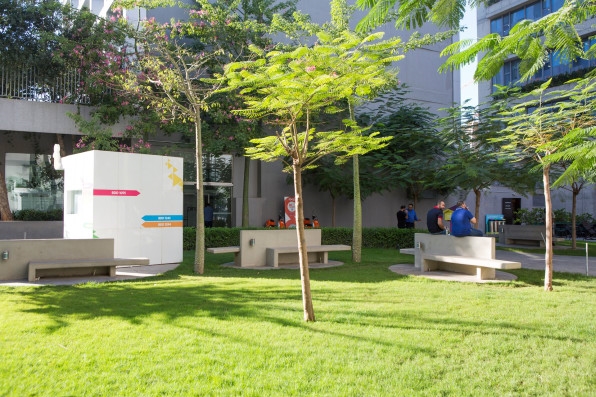
New venture capitalists soon opened shop. Before Circular 331, there were only a couple of firms; now there are nearly a dozen. Incubators and accelerator programs followed suit; almost a half-dozen have sprouted up.
Universities have also started teaching entrepreneurship, and the government is getting on board as well, with plans to modernize the country’s internet infrastructure and the launch of a new fund for telecomm initiatives.
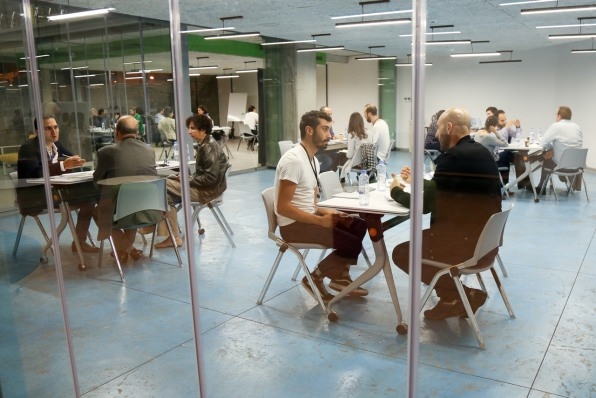
I stopped by BDD one morning to see what this startup revolution looks like. On the second floor of one building sat orange-splashed Speed@BDD, one of the new accelerators. Helming the effort is Sami Abou Saab, a University of California, Berkeley, Haas School of Business alum who gave up a comfortable post at Microsoft’s Skype division in the U.S. two years ago to return home and help grow the ecosystem.
“I’m trying to make an impact,” he says.
I also met meet Ibrahim Ezzedine, the 23-year-old cofounder of Cherpa, a robotics-learning platform. A few tables over, Tarek Tohme, a 20-year-old college student—and full-time startup employee—was soldering an insulin-monitoring device for Spike, another Speed portfolio company.
The mentoring and support taking place in the tight-knit community at BDD is helping change mind-sets, Ezzedine says, by encouraging young founders to believe “that we in Beirut can [create] a product that could compete globally.”
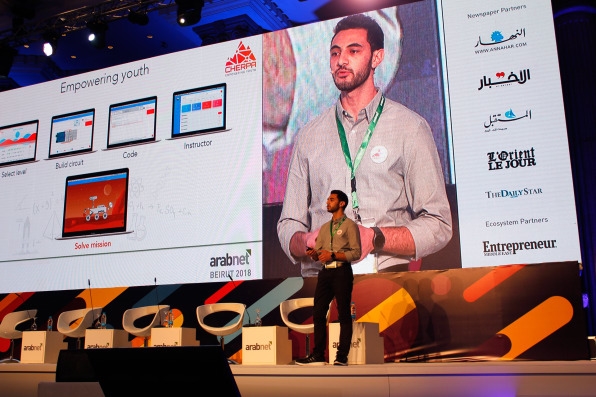
A little while earlier, I’d visited Endeavor Lebanon, the local arm of the global, Edgar Bronfman-chaired accelerator that focuses on later-stage companies. As I sat down, the cofounder of an Endeavor portfolio company walked by. Sensio Air is a pollution-monitoring startup aimed at asthma sufferers. “Their [sensors] are all over the world,” Endeavor Lebanon’s managing director Christina Chehade tells me. “They want to open an office in Detroit.”
Meanwhile, a couple of buildings over sat the offices of Keeward, a 10-year-old global e-commerce company that has offices in Paris, Brussels, New York, and Montreal. There are whispers that the company, which has solved the long-tail problem for books and other goods that the Amazons of the world have generally neglected, could be one of the country’s first unicorns.
Lebanon hasn’t yet registered the world’s top VCs on the radar. Part of that is due to “the CNN effect.” Images of war in places like Syria and Yemen make the entire region look like it’s on fire. There’s also the fact that, despite the country’s progress—the gleaming shopping malls and flocks of Porsches—Lebanon remains a country that doesn’t function particularly well. Daily power outages—even in the capital—are a fact of life that must be mitigated with private generators. Other public services sometimes fall by the wayside, and the internet still moves at a crawl in many places.
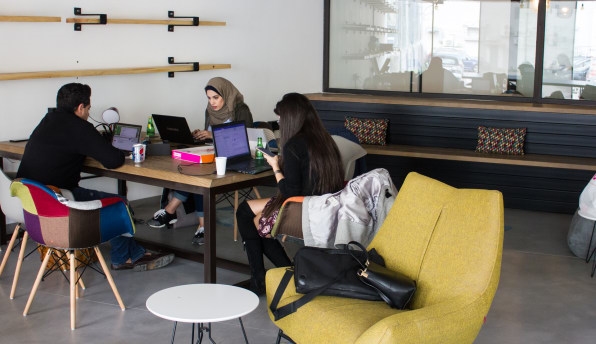
Hala Fadel, an MIT Sloan School of Management grad who cofounded Leap Ventures after the release of Circular 331, argues that the country’s shortcomings are, in fact, its secret advantage.
“Entrepreneurs are inspired by problems,” she says. Combine the pervasive challenges at home with the country’s highly educated workforce—the proportion of engineers in the Middle East rivals that in India—and you’ve got the perfect mix for inventing products with global potential.
“The problems [here] are very similar to the problems you’ll find in other emerging markets,” Fadel says.
Take NAR, for example—Next Automated Robots. In 2014, Nicolas Zaatar and Charlie El Khoury were fresh-faced computer science undergrads when a large forest fire threatened the neighborhood where they lived. A government helicopter was supposed to help firefighters on the ground identify hotspots, but it was delayed for hours. Instead, the residents themselves had to pick up buckets and douse the flames by hand. Later, Zaatar realized drones could have provided the aerial visuals. Two years later, he and El Khoury founded NAR, which has developed an AI-powered solution that processes aerial inspection video for oil and gas pipelines. They’ve since raised a half-million dollars and already have paying customers in the U.S. and Canada.
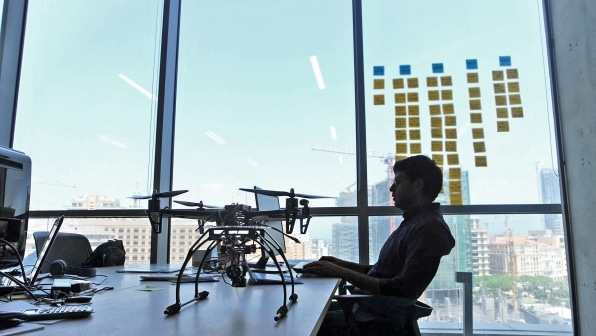
El Khoury, who’s 25 years old, sounds exactly like his globally ambitious peers in more advanced ecosystems when he talks about NAR’s plans to move quickly into new verticals, like power lines and wind turbines. “The faster we go, the better data we can have, and the better positioning in the market,” he says.
Living through war made many Lebanese naturally resourceful and resilient. “You see perseverance in the Lebanese people that you do not see elsewhere,” believes BDD executive Christelle Abou Jaoude Kanj.
Still, plenty of challenges remain. The Lebanese ecosystem is no longer nascent, concluded a World Bank report last year, but it’s “still far from maturity.” Lebanon’s lack of startup-friendly regulations remains a major barrier for founders, according to a new report from ArabNet, which monitors the Arab world’s startup scene. Local investors, who are used to more conventional—read: reliable—assets, are still struggling with the notion that a majority of startups will fail. And at the national level, there doesn’t seem to be a firm plan for developing the industry over the long haul.
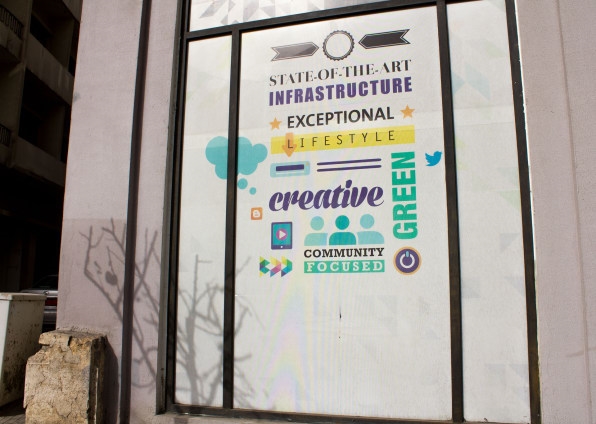
The next few years will be critical. Foreign investors will want to see big exits before dipping a toe into Lebanese waters. (So far there have only been a few, and none for earth-shaking sums.)
Most of the local players, however, are optimistic.
Back at the Endeavor office, Chehade pulled out visualizations of the startup ecosystems in Istanbul (one of the most advanced in the region) and in Beirut. The Istanbul sheet was significantly more dense than Beirut’s—Istanbul has had thousands of startups; Beirut’s still number in the hundreds.
“When do you think this one,” I ask, pointing at the Beirut map, “will look like that one?” I gestured at the one from Istanbul.
“Ten years, if all goes well,” Chehade answers.
I counter that that seems pretty fast.
Undaunted, Chehade points out how far Lebanon’s ecosystem has come in a comparatively short period of time.”It’s growing very fast,” she tells me proudly.
(43)



